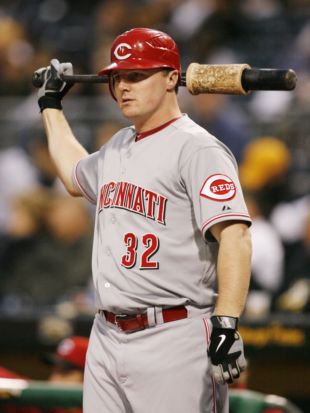
Although Alex Gordon and Jay Bruce came into professional baseball at the same time — both were first-round picks in the stocked draft of 2005 — their paths to MLB relevance have been significantly different. Gordon landed in Kansas City as a well-established collegiate star and was expected to blossom quickly; instead, he flopped for several years before busting out in 2011. The younger Bruce, a high-school flash, enjoyed a much smoother takeoff. He made the Reds for 2008 and has raised his homer total every season.
Bruce carries the bigger price tag as we look to the 2012 roto season. He's currently trading at an ADP of 59 in Yahoo! leagues, while Gordon is at 71. Bruce is also ranked higher in Yahoo's staff rankings, six outfield slots ahead of Gordon. Can we trust the wisdom of crowds on this one, or is there a reason to give Gordon the nod? Scott Pianowski and Brandon Funston have different opinions here and they're taking the debate public. Meet up at the podium, and please share your vote in the comments.
Pianow to Open: There are so many different ways to evaluate players in our stat chase, so many different ways to approach the game. My pick of Gordon over Bruce reflects some of my core beliefs in roto, fundamental staples that I apply every season. It's not to say you can't do well opposing this ideology, but I'm going to stick with what's worked for me.
Every stat carries the same scoring weight in the 5x5 format, but that doesn't mean they cost the same on draft day. I've long felt that batting average and runs scored are traditionally undervalued in most leagues, while the sexy homer and RBI categories are normally overvalued. And I'll add a theme I picked up from Bill James many moons ago: a player who is good in several areas but not outstanding in any one specific skill tends to be underrated. That's just as true in fake baseball as it is in the real game.
Gordon obviously had a better year than Bruce in 2011; Gordon finished 23rd in the Yahoo! player rater while Bruce was 59th. Bruce carried the power stats, while Gordon won the stealth positions: average, runs, stolen bases. That doesn't mean it will play out the same way in the new season, obviously; Gordon's suspiciously-high BABIP from 2011 portends a likely drop in average. But I'll be surprised if Gordon nonetheless doesn't carry those same three categories again, and he won't be a complete zero in the power columns. (Bruce is lucky the Reds let him run at all; he's a woeful 20-for-40 stealing for his career.)
Don't sleep on the underrated Kansas City lineup: the Royals were 11th in runs scored last year, just five tallies behind the Reds. This KC club might be something special when all the kids grow up. I understand the regression police will be tailing Gordon during the heat of draft season, but even if he loses 10 percent of last year's haul, his balanced profile can still outearn Bruce. Doubles to the gap don't make the maidens weep, but our numbers racket isn't just about home runs and highlight clips.
 Funston to Close: Power. It's the toughest thing to find on the waiver wire in competitive leagues.
Funston to Close: Power. It's the toughest thing to find on the waiver wire in competitive leagues.
In fantasy, power translates as home runs and RBIs. And that is where Jay Bruce dominates this conversation.
As the Reds cleanup hitter, Bruce follows NL OBP leader Joey Votto in the lineup. It's a situation that makes projecting 100-plus RBIs a very reasonable proposition. And he's coming off a 32-HR campaign as a 24-year-old, with a HR/FB rate that was actually slightly less than his career norm. Another 30-plus home runs is coming, and given his profile, he has a real shot at winning the NL home run title.
Alex Gordon is a line-drive hitter who doesn't profile for more than low-20s in home runs. And he'll bat leadoff for the Royals. In other words, he won't be in the same area code as Bruce when it comes to the power categories.
The two areas where Gordon seems to clearly win this argument is in stolen bases and batting average. But given Gordon's lofty .358 BABIP last season, which is 44 points higher than his career average, a regression in both categories seems likely - less times on base, fewer stolen bases. And if you think his BABIP is sustainable, think again.
It's too bad Gordon no longer qualifies at 3B, because that would make this a fairer argument. But there's no way I can see myself taking a 28-year-old coming off the luckiest season of his career (and one of the luckiest of the '11 season) over a soon-to-be 25-year-old — read: growth potential - with an elite power profile.